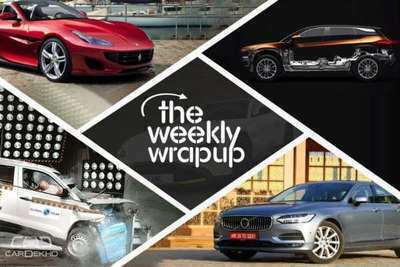Nutson's Weekly Auto News Review July 24 - July 30, 2022
 |
 |
LEARN MORE: Complete versions of today's news nuggets, along with thousands of pages of relevant news and opinions, information stored in a million-page library published and indexed on The Auto Channel during the past 25 years. Complete information can be found by copying a headline and inserting it into any Site Search Box.
Nutson's Automotive Weekly Auto News Wrap-up - Week Ending July 30, 2022 Below are the past week's important, relevant, semi-secret, or snappy automotive news, opinions and insider back stories presented as expertly crafted easy-to-understand automotive universe news nuggets.
* For the sixth straight week, the nation’s average gas price has dropped, falling 17.4 cents from a week ago to $4.33 per gallon on July 25 according to GasBuddy data compiled from more than 11 million individual price reports covering over 150,000 gas stations across the country. The national average is down 56.7 cents from a month ago and $1.19 per gallon higher than a year ago. The national average price of diesel has declined 13.0 cents in the last week and stands at $5.41 per gallon. By mid-week 16 states had gas selling at a $3.999/gallon average.
* Automotive News first reported a breakthrough deal between U.S. Senators Chuck Schumer and Joe Manchin. The deal includes the extension of a popular consumer tax credit for the purchase of electric vehicles, a big win for EV-makers like General Motors, Tesla and Toyota. EV supporters have argued the tax credits are necessary to spur development of the nascent plug-in car market. A prior Biden administration proposal allowed unionized carmakers to offer an additional $4,500 to EV car buyers, but the provision was opposed by Manchin after facing strong blowback from companies such Tesla and Toyota, who argued it would have given an unfair advantage to their Detroit-based rivals.The proposal would lift the 200,000 vehicle cap currently imposed on the $7,500 consumer tax credit for purchasing an EV, and add a new $4,000 credit that could be used by buyers of a used EV. Families earning more than $300,000 wouldn’t qualify for the new EV purchase subsidies. More importantly, the proposal would encourage consumers to buy electric trucks and SUVs instead of electric sedans. Cars priced above $55,000 would not be eligible for the new tax credits. However, buyers of electric trucks priced up to $80,000 could get the tax break
* Meanwhile: The U.S. federal government provides a $7,500 tax rebate on the purchase of most electric vehicles. But the average car buyer would be happier with cash up front, even if the value was lower. A new study from George Washington University found that the average car buyer would be happier with an incentive up to $1,440 lower if they could collect it at the moment of purchase rather than waiting until they file their taxes after buying the car. Lower-income buyers valued the immediate cash rebate more than the average buyer.
* According to the just-published 2022 AlixPartners Global Automotive Outlook the semiconductor shortage will continue affecting vehicle supply through 2024. Electric vehicle charging is emerging as a critical gap. Infrastructure remains in need of investment. The latest AlixPartners forecast calls for BEVs to be the majority vehicle type by 2035 in all major regions, surpassing internal-combustion-engine (ICE) vehicles.
* U.S. DoE factoid of the week: The average American household spent $9,826 on transportation in 2020, which accounted for 16% of all annual household expenditures. Transportation expenditures include vehicle purchases, gasoline and motor oil, other vehicle expenses (maintenance, insurance, etc.), and public transportation costs. For households with incomes between $50,000 and $59,999, transportation accounted for 18% of total expenditures – the highest share of any income group. While those in the highest income group spent more on transportation overall, it made up only 13.3% of their household expenditures, the lowest share of any income group.
* From Reuters we read, a coalition of consumer, safety and automotive technology watchdog groups is pleading with automakers to adopt standard, no-frills names to describe advanced safety technology, including cruise control systems that mimic automated driving, but do not replace human drivers. AAA, Consumer Reports, J.D. Power, the National Safety Council, Partners for Automated Vehicle Education and SAE International are proposing plain-vanilla names that are more descriptive of the functions of, say, distance-keeping cruise control combined with a lane-keeping function than labels such as “Co-Pilot 360,” “Super Cruise,” or “Drive Pilot.” The “Clearing the Confusion” campaign would call these systems: “Adaptive cruise control” and “lane keeping assistance.” Automakers may not reject these proposals out of hand, although sidelining expensive branding projects won’t be done lightly. The industry faces a risk that government regulators could step in to demand standardization
* GM wants to help potential electric vehicle buyers to learn about buy,,ing, operating and maintaining a battery-electric vehicle. GM launched a new, free EV Live website is for consumers, dealers, fleet buyers and GM employees to connect with real people and trained specialists. A wide range of EV topics can be discussed and reviewed. See for yourself: https://evlive.gm.com
* That pickup truck parked at the side of the road may not be your local homebuilder. Ford unveiled America’s first electric pickup truck purpose-built for police: the 2023 Ford F-150 Lightning Pro Special Service Vehicle. The F-150 Lightning features a really big front trunk, so behave yourself.
* Last year Petaluma, California in Sonoma County voted to ban the construction of new gas stations. Four other Bay Area cities followed suite. And now, leaders in California’s most car-centric metropolis--Los Angeles, are hoping to bring the climate-conscious policy to Southern California.
* Mitsubishi is recalling 56,080 model year 2022 Outlanders because the rearview camera may not display the rearview image due to a software error. An inoperable rearview camera display reduces the driver's rear view, increasing the risk of a crash.
* Not since Emmanuel Zervakis in April 1960 has any NASCAR Cup race winner been disqualified. Denny Hamlin was declared the winner of the NASCAR Cup race at Pocono last weekend. Post-race technical inspection revealed "some material that was somewhere where it shouldn't be." It seems the front fascia was altered which would impact aerodynamics. Joe Gibbs Racing Hamlin and runner-up finisher Kyle Busch were DQ'd. Reminds us of Smokey Yunick who said, "if the rule book doesn't say you can't do it, you can do it".
* Four times world champion Sebastian Vettel announced his retirement from Formula One at the end of the season, saying his goals had changed and he wanted to focus more on family and interests outside the sport. The 35-year-old German, who drives for the Aston Martin team, won his titles with Red Bull from 2010-13 and also spent six seasons with Ferrari.
* Porsche plans to enter Formula 1 with Red Bull. Automotive News reports the sports-car maker plans to buy half of Red Bull Technology. In April, VW Group's Supervisory Board approved plans for Porsche and Audi to join Formula 1. In May, Porsche CEO Oliver Blume confirmed that the company had started developing an engine for the race series.
Stay safe. Be Well.


